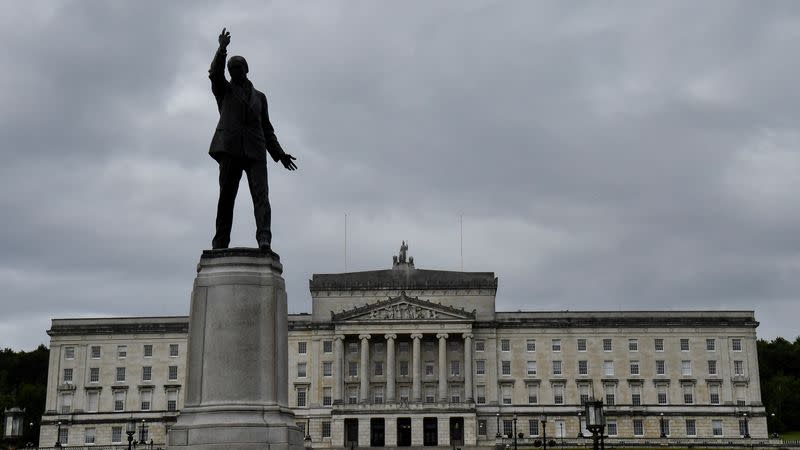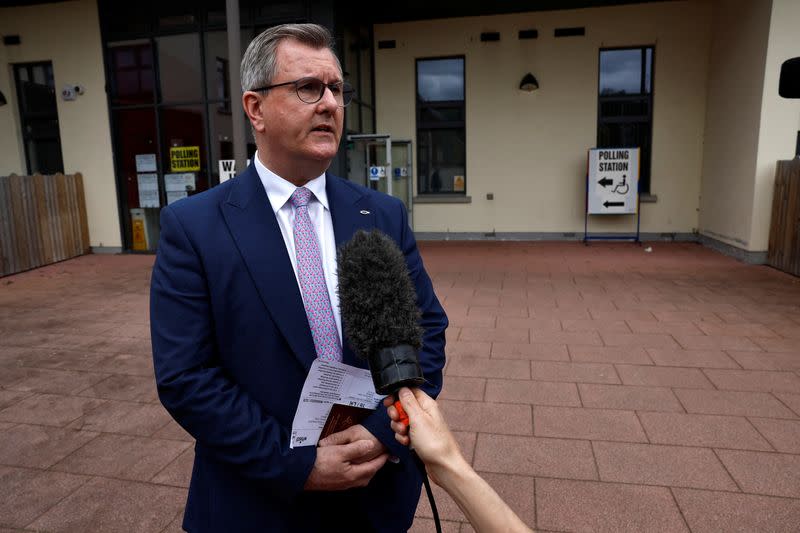After two years of deadlock, N. Irish government could return in days
By Amanda Ferguson
BELFAST (Reuters) -Northern Irish and British politicians voiced optimism on Tuesday that the regional power-sharing government could be restored quickly following a breakthrough overnight, ending a near two-year crisis that threatened a key part of the 1998 peace deal.
After months of negotiations, the leader of the Democratic Unionist Party (DUP) said the party had endorsed proposals agreed with London on post-Brexit trade rules to end its boycott of the government which it quit in February 2022.
The DUP, the region's largest pro-British party, had argued that London's Brexit deal with the European Union undermined Northern Ireland's place in the United Kingdom by demanding checks on some goods coming from Britain.
But London's offer to cement Northern Ireland's position in the UK in law, plus a 3.3 billion pound ($4.2 billion) financial package, looked set to win over the DUP.
All sides want to move quickly before critics unpick the proposals and imperil the restoration of regional government, a key part of the 1998 Good Friday Agreement to end decades of sectarian violence.
Party leader Jeffrey Donaldson told BBC Radio Ulster the government could be restored within days "if the (UK) government moves with the speed that I believe they can".
He said the legislation would have two elements; one designed to affirm Northern Ireland's place within the UK and the other amending the UK Internal Market Act to "protect the region's ability to trade with the rest of the UK".
"Have we achieved everything that we wanted to achieve?" he asked. "No, we haven't. I will be honest with people about what we've been able to deliver."
Chris Heaton-Harris, Britain's Northern Ireland minister, said he looked forward to "the restoration of the institutions of (the Northern Ireland Assembly) Stormont as soon as possible".
He declined to offer any detail on the deal. If finalised in Northern Irish party talks later on Tuesday, the proposals will be published on Wednesday.
The three other parties set to form a new executive - Sinn Fein, the Alliance Party and the Ulster Unionist Party - broadly welcomed the developments and said they were ready to go back into government.
MUCH AT STAKE
London has kept its proposals under wraps to try to prevent them being undermined by hardened opponents of the post-Brexit trade deal with the EU as both sides sought to end the impasse.
The two-year hiatus has put pressure on stretched public services and led to a budget deadlock with London. That triggered the biggest public sector strike in a generation this month after Northern Irish workers failed to receive pay increases given to others across the UK.
Steve Baker, a junior Northern Ireland minister, tried to pre-empt concerns that the changes might require Britain again to follow some EU regulations - which would infuriate advocates of Brexit.
"There are no commitments of any kind ... to align GB (Great Britain) with EU law; prevent GB from diverging from any retained EU law; or increase alignment in Northern Ireland beyond the strictly limited scope parliament has approved," he said on X.
Irish Prime Minister Leo Varadkar said his government and the European Commission still had to see the final deal to be confident it did not have any negative consequences for last year's reworked post-Brexit deal for Northern Ireland or the Good Friday Agreement.
But following a "good" phone call with his British counterpart, Rishi Sunak, Varadkar told Ireland's parliament that he hoped a new government would be formed by Feb. 8.
($1 = 0.7890 pounds)
(Additional reporting by Padraic Halpin in Dublin, Writing by Elizabeth Piper; Editing by Kevin Liffey, Christina Fincher, Ros Russell)


